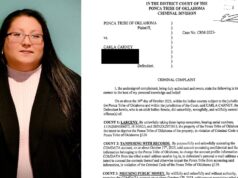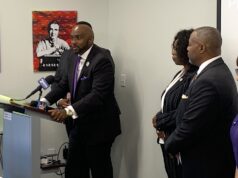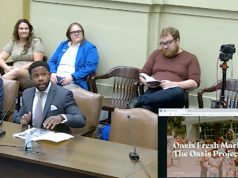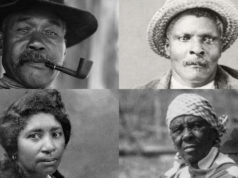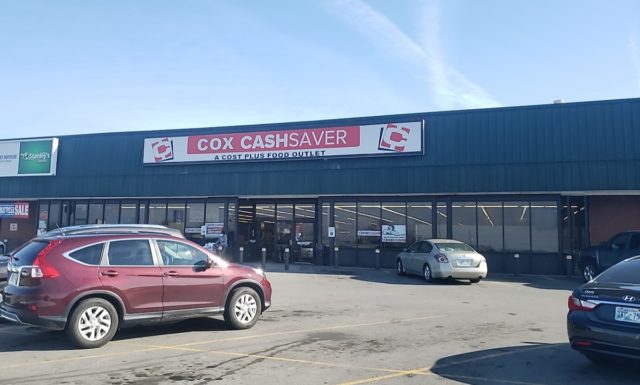
OKMULGEE — An Okmulgee grocery store remains at the center of a four-year legal battle over whether it should remit sales tax to the state of Oklahoma or the Muscogee Nation, as the store is located on land leased to a private company by the Bureau of Indian Affairs. However, if the Okmulgee City Council approves a $250,000 incentive package at a 5 p.m. meeting Tuesday, the store may move off the property altogether and leave the underlying tax jurisdictional questions to be answered another time.
After receiving notices from the Oklahoma Tax Commission and the Muscogee Nation Tax Commission in which each entity stated it was entitled to retail sales tax collections from Warehouse Market’s Cox Cash Saver property at 1701 S. Wood Dr., Warehouse Market filed an interpleader lawsuit in December 2018, with the OTC and the MNTC both listed as defendants.
The Muscogee Nation was dismissed from the suit quickly, owing to its sovereign immunity as a tribal nation. State and federal courts eventually declared that the dispute should be considered a tax protest between OTC and Pinnacle Management & Consulting, LLC — the company that leases the property, on which the Cox Cash Saver is located, through a Bureau of Indian Affairs master lease.
Okmulgee Mayor Richard Larabee and Sen. Roger Thompson (R-Okemah) both told NonDoc that they believe the Oklahoma Tax Commission issued a decision on the Cox Cash Saver sales tax conundrum in the second half of 2021. Thompson said he did not know the details, but Larabee said it is his understanding that the OTC ruled that the city, county and state — and not the Muscogee Nation — are entitled to the sales tax revenues held in escrow and not distributed during the dispute.
But the Oklahoma Tax Commission’s decision on the matter is protected as “confidential taxpayer information,” said Cassandra Sweetman, public information and press liaison for the state agency.
An Okmulgee City Council meeting set for 5 p.m. Tuesday is expected to provide more clarity on the situation. The meeting agenda includes an item stating that Okmulgee City Council members will discuss and possibly vote on the re-establishment of the Cash Saver grocery store at its former Okmulgee location with a $250,000 contribution from city sales tax proceeds, which would be released from escrow and paid to the grocery store upon the different location’s opening.
The store is currently located on the south edge of town, but it was previously located closer to the city’s core at 420 E. 8th Street. Although it references the 8th Street address incorrectly, the City Council agenda item states:
Discussion and possible vote to approve or reject a proposal from
Warehouse Market (Cash-Saver) to establish a grocery store located at 420 W. 8th Street in Okmulgee. The proposal consists of a contribution from the City of Okmulgee in the amount of $250,000.00, from sales tax proceeds released from escrow, to be paid to Warehouse Market (CashSaver) upon the opening of a full service grocery store at that location.
Warehouse Market had previously operated its business in the 420 E. 8th Street property, and Larabee said it retained a right of first refusal, which the company exercised in November to purchase the property.
After the City of Okmulgee received the sales tax funds following the OTC ruling, Warehouse Market approached the city and asked for $250,000 of that funding to help remodel the 8th Street property and then move into it so as to eliminate the overarching question of taxation jurisdiction. The Okmulgee City Council is slated to discuss the incentive payment during Tuesday’s meeting.
Thompson, who represents Okmulgee in the State Senate, said the sales tax dispute has caused drama at all levels of government and that the Oklahoma Tax Commission has moved the situation toward a resolution.
“I’m not sure what that ruling was, but they reached an agreement, and they’re moving off of [the land in question] now and moving into another grocery store there in Okmulgee,” Thompson said.
A manager at the current Cox Cash Saver grocery store directed NonDoc to call the Warehouse Market corporate office with questions, but calls to the company were not returned prior to the publication of this story.
Muscogee Nation press secretary Jason Salsman said the tribe would not comment on the sales tax situation until after Tuesday’s City Council meeting.
Sales tax dispute predated McGirt v. Oklahoma

The complicated situation regarding the Okmulgee grocery store has lingered for years.
Warehouse Market attorneys filed a complaint in the U.S. District Court for the Northern District of Oklahoma on Nov. 10, 2020. The company sought a ruling that the Oklahoma Tax Commission is not entitled to collect sales tax from its Okmulgee grocery store because it is located on restricted Indian land.
While the complaint was filed in 2020, the sales tax dispute between Warehouse Market, the Oklahoma Tax Commission and the Muscogee Nation dates back to 2018, about two years before the July 2020 U.S. Supreme Court ruling in McGirt v. Oklahoma that affirmed the Muscogee Nation’s Indian Country reservation and raised additional questions about taxation jurisdiction in eastern Oklahoma.
Thompson said he has a good relationship with leaders of the Muscogee Nation, who are looking at what civil jurisdiction expansions may apply now that their reservation has been affirmed.
“There is certainly a push on the nation’s side for their sovereignty, and they’re looking at what they can do within that sovereignty,” Thompson said. “You’ve got the Department of the Interior that recently came down on mines and says that the state doesn’t have jurisdiction over it. They’re looking at different license fees. Should they have to pay those or not pay those if they have their own sovereignty? So I think they’re going through the process as well.”
Thompson said he is hopeful that both state and tribal officials can work out these issues together to avoid additional litigation and civic disputes.
“My concern is that we go to separate corners instead of just getting around a table and talking through these issues,” Thompson said.
Follow @NonDocMedia on:
Mayor: City ‘not trying to undermine the tribe’
Warehouse Market collected from customers and remitted to the Oklahoma Tax Commission a combined 10.083 percent sales tax for state and local jurisdictions until October 2018. One month prior, Warehouse Market received a letter from the Muscogee Nation stating that, effective Oct. 1, 2018, any retail sales tax collected at the store would be subject to a 6 percent sales tax from the Muscogee Nation. Additionally, the letter stated that Warehouse Market is only obligated to collect taxes for the Muscogee Nation Tax Commission and has no obligation to pay taxes to any city, county or state agencies.
For the month of October 2018, Warehouse Market submitted full payment of 6 percent of its October sales tax to the Muscogee Nation and an additional 10.083 percent to the OTC. The company then notified the OTC that, pursuant to the MNTC notice, the grocery store would stop remitting sales tax to the OTC.
On Nov. 21, 2018, OTC sent a letter to Warehouse Market stating that sales on restricted Indian land were subject to state and local taxes. The letter also warned Warehouse Market that “failure to remit state and local sales to the state would result in closure of the business and/or revocation of the business’s sales tax permit.”
On Nov. 30, 2018, Warehouse Market received another notice from the MNTC stating that “Warehouse Market was in violation of tribal sales tax rules and would be subject to interest, fines, and/or revocation of license(s) if remedial action was not taken.”
On Dec, 21, 2018, Warehouse Market filed its interpleader lawsuit in Okmulgee County District Court with OTC, Muscogee Nation and Pinnacle Management & Consulting, LLC as defendants.
The Muscogee Nation was dismissed from the suit owing to its sovereign immunity. The district court then delivered an order, which stated, “Defendant Oklahoma Tax Commission is not currently entitled to retail tax proceeds at plaintiff’s subject matter retail establishment unless and until the legitimate dispute between the Muscogee Nation and the Oklahoma Tax Commission as to taxation authority is resolved in another forum or tribunal.”
OTC appealed that decision to the Oklahoma Supreme Court, continuing to insist that it is entitled to collect sales tax from Warehouse Market’s Cox Cash Saver grocery store in Okmulgee. Pending a further decision, which would give further clarity as to which entity has taxation jurisdiction, Warehouse Market continued to collect 10.083 percent sales tax from customers and placed it in escrow as the dispute continued.
Within their complaint, Warehouse Market attorneys stated that “OTC’s attempt to tax sales is contrary to the general, long-time federal policy of encouraging tribal self-sufficiency and economic development.”
The attorneys argued that “OTC’s attempt to tax sales on Indian land frustrates that goal, because no business would agree to open a retail store on restricted land that was required to collect double taxes from its customers — 6 percent for the nation, and 10.083 percent for the state.”
On Jan. 5, 2021, U.S. Northern District Judge Claire Eagan filed an opinion and order granting OTC’s request for a stay on the case until the Oklahoma Supreme Court delivered a decision.
The Oklahoma Supreme Court issued a decision Feb. 2, 2021, which stated in its conclusion that “once the trial court dismissed the Muscogee Nation because of its sovereign immunity, Warehouse Market’s district court action became a tax protest. As a tax protest, administrative remedies must be exhausted before a protestant may resort to relief in the courts.”
Moreover, the Oklahoma Supreme Court determined the issue should be settled by the three-member Oklahoma Tax Commission, not the courts, since the sales tax dispute was considered a tax protest. The Oklahoma Supreme Court sent the case back to the District Court for the Northern District of Oklahoma with instructions to dismiss it.
Sweetman, the OTC spokeswoman, said the state agency cannot disclose whether a resolution was reached on the Okmulgee grocery store sales tax dispute.
Larabee, the Okmulgee mayor, said the sales tax money being held in escrow has been split between the state, Okmulgee County and the City of Okmulgee.
“I don’t feel like this is any point of contention between us and Muscogee Nation. I had a good talk about it with Second Chief [Del Beaver] on Saturday,” Larabee said Monday. “We seem to be on the same page on everything. It’s hard to say whether or not that same mindset is shared with the council or not, I don’t know. But we’re not trying to undermine the tribe here. This is a business wanting to move to another location in town and asking us for an incentive to do so, and so our council will vote on that incentive. It has nothing to do with trying to take back something from the Muscogee Nation.”
Thompson said he also does not want to city the city and the tribal nation at odds over jurisdictional questions.
“I think we got to get around the table and work, and that’s what I’m trying to do in my Senate district is have a great relationship with the tribe,” Thompson said. “They’re great partners with us, and we’re going to make sure that partnership continues.”










